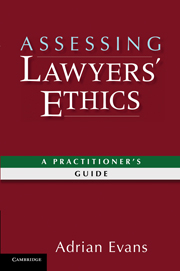Book contents
- Frontmatter
- Contents
- Preface
- List of figures
- Acknowledgements
- 1 An opportunity for law societies
- 2 Ethical failures, research and core qualities
- 3 Understanding ethical methods and types
- 4 Mechanisms to offset business pressure on legal ethics
- 5 Discovering practitioners' opinions about ethics assessment and psychological testing for integrity
- 6 Developing character
- 7 Measuring awareness of values and ethics
- 8 Entrenching ethics assessment
- Appendix A Research methods
- Appendix B Awareness of ethical type
- Appendix C Prototype scale of preference for legal ethical type
- Index
8 - Entrenching ethics assessment
Published online by Cambridge University Press: 10 January 2011
- Frontmatter
- Contents
- Preface
- List of figures
- Acknowledgements
- 1 An opportunity for law societies
- 2 Ethical failures, research and core qualities
- 3 Understanding ethical methods and types
- 4 Mechanisms to offset business pressure on legal ethics
- 5 Discovering practitioners' opinions about ethics assessment and psychological testing for integrity
- 6 Developing character
- 7 Measuring awareness of values and ethics
- 8 Entrenching ethics assessment
- Appendix A Research methods
- Appendix B Awareness of ethical type
- Appendix C Prototype scale of preference for legal ethical type
- Index
Summary
Improvements, not solutions
Significant cases of legal practitioner misbehaviour in the Australian context provided the impetus for this book; but the literature and research confirm wider international concern for ethical legal conduct in all developed jurisdictions. Criticism about overcharging, conflicting behaviours and insufficient commitment to social obligations are all part of the picture. In short, although many good lawyers continue, as ever, to try to make a difference, individuals and firms are seen too often to be there for themselves and for their client of the moment, rather than also for a wider commitment to ethical practice.
The fact that anecdotal distaste for lawyers' activities is perennial does not limit the urgency of challenges from many quarters. Among them are competitive pressures from non-lawyers; external regulators' scrutiny and restriction of historic privileges (especially complaint handling and legal professional privilege); new lawyer disillusion, depression and then early departure after significant intra-firm training; partners' caution about their fellow partners; employee identification not with the profession per se but with the firm, corporation or government which employs them; and the self-expressed culture of total commitment to the firm, for those that remain. All these influences contribute to a stressful workplace and a dimmed vision as to the importance of ethical lawyers.
The need for ethical lawyers is self-evident, but deciding how to nurture them in greater numbers has proved elusive. Broadly speaking, law schools have had as little success in this task as the profession.
- Type
- Chapter
- Information
- Assessing Lawyers' EthicsA Practitioners' Guide, pp. 225 - 239Publisher: Cambridge University PressPrint publication year: 2010

